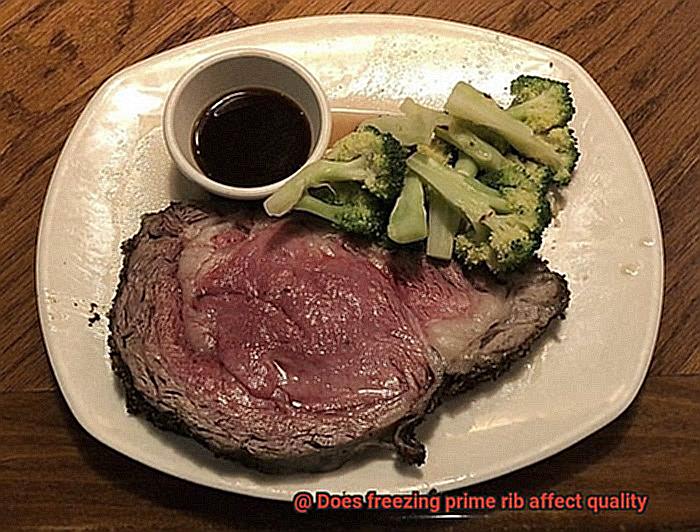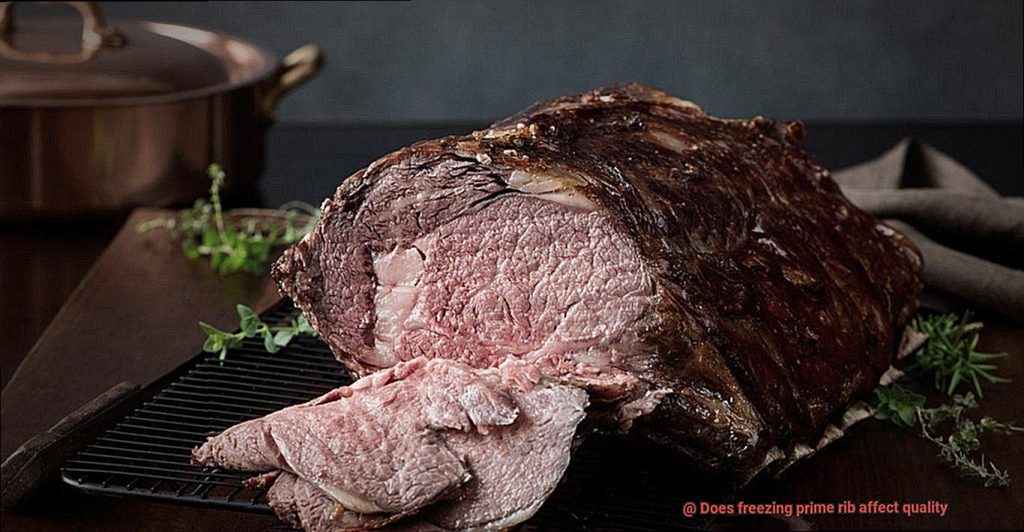Imagine this: You’ve got a mouth-watering, perfectly marbled prime rib all set for your next dinner party. The excitement builds as you season and prepare the meat, but then you realize that you forgot to thaw it out. Dread sets in as you wonder if freezing it will ruin the flavor and texture of your prized cut.
The debate on whether freezing prime rib affects quality has been going on for ages. Some people say that freezing it leads to a loss of flavor, while others argue that it is safe and doesn’t affect the meat’s quality at all.
So what is the truth? In this blog post, we’ll uncover the science behind freezing prime rib and its impact on taste, texture, and safety. We’ll explore various factors that can affect quality such as freezer temperature and packaging.
Moreover, we’ll delve into the debate surrounding how long to freeze prime rib for optimal results, as well as how to properly thaw the meat to ensure maximum flavor and texture.
By the end of this post, you’ll have a crystal clear understanding of whether freezing prime rib is right for you, and exactly how to do it without sacrificing quality. So let’s get started and learn how to preserve your prime rib’s deliciousness even after being frozen.
Contents
What is Prime Rib?
Prime rib is more than just a cut of beef; it’s a culinary experience. This succulent and flavorful meat is highly sought after for special occasions and high-end restaurants, thanks to its marbling, tenderness, and rich taste. It comes from the rib section of the cow and is considered the crème de la crème of beef cuts, earning its name from the highest grade of beef, determined by the amount of marbling in the meat.
Roasted to perfection, prime rib is typically served as a large, bone-in cut that can feed several people. Seasoned with salt, pepper, and other herbs and spices, it exudes an aroma that can tantalize anyone’s palate.
While prime rib is a delicacy, it can also be quite expensive. However, freezing leftovers or purchasing frozen prime rib can help save money without compromising quality. But does freezing this high-grade meat affect its excellence? Let’s explore this further.
One concern with freezing prime rib is the potential for freezer burn. Air exposure can cause the meat to dry out, leading to poor texture and flavor. To prevent this from happening, wrap the meat tightly in plastic wrap or aluminum foil before placing it in the freezer. Alternatively, you may use freezer-safe bags or containers to keep air out.
Another factor to consider is how long prime rib can be safely frozen. Although freezing meat is safe for an extended period, consuming it within six months guarantees optimal quality. After that, the texture and flavor may begin to deteriorate.
It’s worth noting that cooking frozen prime rib may take slightly longer than fresh meat and may release more moisture during cooking, resulting in less browning. However, if frozen correctly and thawed appropriately, prime rib can retain its quality and taste just as good as fresh meat.
What is Freezer Burn?
As an expert on all things freezer burn, let me help you understand what it is and how to prevent it from ruining your meals.
Freezer burn occurs when food is exposed to air while being frozen for an extended period. This exposure causes the moisture in the food to evaporate, forming ice crystals on the surface that then sublimate without melting. As a result, the surface of the food becomes dry, tough, and discolored, affecting its texture, color, and flavor.
But don’t worry – there are ways to prevent freezer burn from ruining your favorite meals. Proper storage techniques are key to keeping your food fresh and delicious. Here are some helpful tips:
- Use airtight containers: Invest in airtight containers made for freezing food. They’ll help keep out air and moisture that cause freezer burn. Plus, they come in different sizes and shapes to fit your needs.
- Wrap tightly: If you don’t have airtight containers, wrap your food tightly in plastic wrap or aluminum foil. Be sure to remove as much air as possible before wrapping. You can also use freezer bags with zip locks for added protection.
- Label and date: Don’t forget to label and date your frozen foods so you know how long they’ve been stored. This will help you keep track of which foods need to be eaten first to avoid waste.
By following these simple steps, you can preserve the quality of your frozen foods for up to six months. Proper storage techniques can make a huge difference in taste and texture when it comes to frozen foods like prime rib. Keep enjoying those frozen meals with confidence knowing you’re preserving their quality for later.
How to Properly Freeze Prime Rib
Freezing it is a great option, but to maintain its quality, it’s vital to do it correctly. As an expert in freezing prime rib, I’m here to share my tips and tricks with you.
Cool the Meat Down Before Wrapping:
After cooking your prime rib, let it cool down entirely before wrapping it for the freezer. This prevents bacterial growth and ensures even freezing, which helps preserve its quality.
Wrap It Tightly:
Use plastic wrap or aluminum foil to wrap the prime rib tightly and avoid any air pockets. This prevents freezer burn and loss of flavor, ensuring that your prime rib stays just as delicious as when it was fresh.
Use Airtight Containers or Bags:
Place the wrapped prime rib in a freezer-safe bag or an airtight container to prevent any air from getting in. Label it with the date and contents for easy identification later on.
Freeze at 0°F or Below:
Keep your freezer temperature at or below 0°F to ensure that your prime rib stays frozen and doesn’t lose its quality. A chest freezer is more effective at maintaining a consistent temperature than an upright one.
Thaw Slowly in the Refrigerator:
When you’re ready to use the frozen prime rib, thaw it slowly in the refrigerator for 24-48 hours before cooking. Avoid thawing at room temperature or in warm water as this can promote bacterial growth and affect the texture and flavor of the meat.
Pros and Cons of Freezing Prime Rib
You may have considered freezing this delicious cut of beef for later use. But before you break out the freezer bags, let’s explore the pros and cons of freezing prime rib.
First, let’s focus on the good news. Freezing prime rib can be a convenient solution to preserve your meat for future meals. Whether you’re buying in bulk or planning ahead for a special occasion, freezing can help you save money and have prime rib on hand whenever you want it.
Not only that, but freezing can also help lock in the flavor and juices of the meat when done correctly. The key is to freeze your prime rib at 0°F or below and wrap it tightly to prevent freezer burn. This way, the ice crystals are small and evenly distributed throughout the meat, minimizing any loss of flavor and tenderness.
However, there are also potential downsides to consider. Freezer burn is a real concern when it comes to freezing prime rib. Dry spots can become tough and tasteless, affecting both the texture and flavor of your meat. Nobody wants that.
Furthermore, freezing prime rib requires careful preparation. Before placing it in an airtight freezer bag or container, you need to wrap your meat in plastic wrap or aluminum foil to prevent any air from getting in. Plus, ensuring your freezer is set to 0°F or lower is crucial to prevent bacterial growth that could spoil your meat.
In summary, the decision to freeze prime rib depends on personal preferences and priorities. While it can be a convenient way to extend your meat’s shelf life and preserve its flavor and juices, it’s important to be aware of the potential downsides and take steps to minimize any negative effects.
To help make your decision easier, here’s a quick list of pros and cons:
Pros:

- Convenience: Freeze prime rib for later use.
- Saving Money: Buy in bulk and freeze for later use.
- Lock in Flavor and Juices: When done correctly, freezing can help lock in the flavor and juices.
Cons:
- Freezer Burn: Can affect both texture and flavor of meat.
- Careful Preparation Required: Wrapping meat tightly and ensuring proper freezer temperature is crucial.
Effects of Freezing on Quality
When meat is frozen, ice crystals form, which can damage the muscle fibers and cause the meat to become tough and dry. Additionally, moisture loss during the thawing process can lead to a less tender and less flavorful final product.
However, there are ways to minimize these negative effects and still enjoy your prime rib after it has been frozen. First and foremost, proper preparation is crucial. Wrapping the prime rib tightly in plastic wrap or aluminum foil before placing it in an airtight freezer bag can help prevent freezer burn and reduce the formation of large ice crystals. This will help maintain its quality and flavor when it’s time to cook.
Another important factor is freezing the meat as quickly as possible after purchasing or preparing it. Rapid freezing reduces the size of ice crystals, preventing them from damaging the meat fibers. And when it comes to storage, time is of the essence. The longer prime rib is stored in the freezer, the lower its overall quality will be when it is finally thawed and cooked. For best results, consume frozen prime rib within six months of freezing.
In conclusion, while freezing prime rib can have some negative effects on its quality, these effects can be minimized by proper preparation and storage techniques. Here’s a summary of what you need to do:
- Wrap the prime rib tightly in plastic wrap or aluminum foil before placing it in an airtight freezer bag
- Freeze the meat as quickly as possible after purchasing or preparing it
- Consume frozen prime rib within six months of freezing
How Long Can You Freeze Prime Rib?
If you’re a fan of prime rib, then you know how delicious and juicy it can be. However, what do you do when you have leftover prime rib that you can’t finish in one sitting? The answer is simple: freeze it. But how long can you freeze prime rib before its quality is affected? As an expert in this field, let me share some tips and best practices with you.
Firstly, the length of time that you can freeze prime rib depends on several factors, such as the temperature and conditions in which the meat is stored. Generally speaking, prime rib can be stored in a freezer for 6-12 months without any significant loss of quality. However, it’s important to note that the longer you freeze the meat, the more its texture and flavor may be affected.
To ensure that your frozen prime rib stays fresh and flavorful, proper storage is key. Before freezing, wrap your prime rib tightly in plastic wrap or aluminum foil to prevent freezer burn and protect the meat from exposure to air, which can cause oxidation and spoilage. Once wrapped, place it in a freezer bag or container.
When it comes time to thaw your frozen prime rib, patience is key. Thawing too quickly can result in uneven thawing and affect the quality of the meat. It’s recommended to thaw your meat slowly in the refrigerator, allowing one day for every four pounds of meat to thaw completely. Avoid thawing the meat at room temperature or using a microwave.
In summary, freezing prime rib can be an excellent way to preserve its quality for an extended period. However, it’s crucial to follow proper storage and thawing techniques to ensure that your meat stays fresh and flavorful. To help you remember these tips easily, here’s a quick summary:
- Freeze prime rib for 6-12 months
- Wrap tightly in plastic wrap or aluminum foil before freezing
- Thaw slowly in the refrigerator, allowing one day for every four pounds of meat
- Avoid thawing at room temperature or using a microwave
Cooking Frozen Prime Rib vs Fresh Prime Rib
The age-old question of whether to cook fresh or frozen prime rib has been debated for years. While fresh prime rib is the preferred choice for flavor and texture, frozen prime rib can be a convenient option for those who want to plan ahead or have limited access to fresh cuts. But is it worth the risk of potentially sacrificing quality?
The answer is yes and no. Freezing can cause the meat to lose some moisture, which can impact its texture and flavor. It’s important to note that if the prime rib was not frozen properly or was left in the freezer for too long, it can develop freezer burn, which can further impact its taste and texture. However, with proper preparation and cooking techniques, frozen prime rib can still turn out delicious and tender.
To ensure your frozen prime rib turns out just as mouthwatering as its fresh counterpart, you must thaw it properly and slowly. You can do this by placing the frozen prime rib in the refrigerator for several days until it’s completely thawed. Alternatively, if you’re in a rush, you can place it in a sealed plastic bag and immerse it in cold water, changing the water every 30 minutes until it’s thawed.
After thawing, generously season your prime rib with salt and pepper or any desired seasoning rub, and let it come to room temperature before cooking. Keep in mind that when cooking frozen prime rib, it may take slightly longer to reach the desired internal temperature due to its lower starting temperature.
When it comes to fresh prime rib, there’s nothing quite like the taste and texture of a freshly cut piece of meat. However, don’t discount frozen prime rib just yet. With proper preparation and cooking techniques, frozen prime rib can still be a viable option.
Tips for Ensuring Quality When Freezing Prime Rib
If you want to have a delicious prime rib anytime, freezing it can be a great option. However, to ensure the quality of your meat is not compromised, it’s important to take proper precautions. Here are five tips for ensuring quality when freezing prime rib.
Choose the Right Packaging
The packaging you choose can make a significant difference in how well your prime rib freezes. For the best results, use vacuum-sealed bags or freezer-safe plastic wrap. These materials create a barrier that prevents freezer burn and other forms of damage. Make sure to wrap the meat tightly, removing as much air as possible from the packaging.
Label and Date Your Packages
Labeling and dating your packages is crucial for maintaining quality. By doing so, you’ll know when the prime rib was frozen and what it contains. This will help you keep track of how long the meat has been frozen and ensure that it’s still safe to eat.
Freeze as Quickly as Possible
The longer it takes for your prime rib to freeze, the more likely it is to suffer from damage or spoilage. To prevent this, freeze your meat as quickly as possible. Place it in the coldest part of your freezer and make sure there is plenty of air circulation around the package. This will help the meat freeze evenly and quickly.
Use a Deep Freeze
If you have a deep freeze, use it. These freezers are designed to keep food at a constant, low temperature, which is ideal for preserving the quality of your prime rib. A deep freeze also provides more space and can accommodate larger cuts of meat.
Thaw Slowly
When it’s time to cook your prime rib, thaw it slowly in the refrigerator. This will preserve its texture and flavor while ensuring that it’s safe to eat. Thawing at room temperature or in a microwave can cause the meat to lose moisture and result in a less flavorful, less tender final product. Allow the meat to thaw slowly over several hours or even overnight.
lxLYSSDq5VY” >
Conclusion
In conclusion, the quality of prime rib can be preserved through proper freezing techniques. However, it’s important to take necessary precautions to prevent freezer burn from affecting its flavor and texture. Wrapping the meat tightly in plastic wrap or aluminum foil before placing it in an airtight container is crucial. Freezing the meat as soon as possible after purchasing or preparing it will also help minimize damage to the muscle fibers.
Thawing frozen prime rib requires patience and planning. Rapid thawing can result in uneven thawing and compromise the quality of the meat. To ensure the best results, it’s recommended to thaw slowly in the refrigerator, allowing one day for every four pounds of meat to fully defrost.
Although fresh prime rib is always preferred for optimal taste and texture, properly frozen and prepared prime rib can still be delicious and tender. By following these guidelines for freezing prime rib, you can enjoy this mouth-watering cut of beef anytime without sacrificing its excellence.
So don’t hesitate to freeze that leftover prime rib or stock up on frozen cuts – just remember to wrap tightly, label and date your packages, freeze as quickly as possible, use a deep freeze if available, and thaw slowly in the refrigerator.






